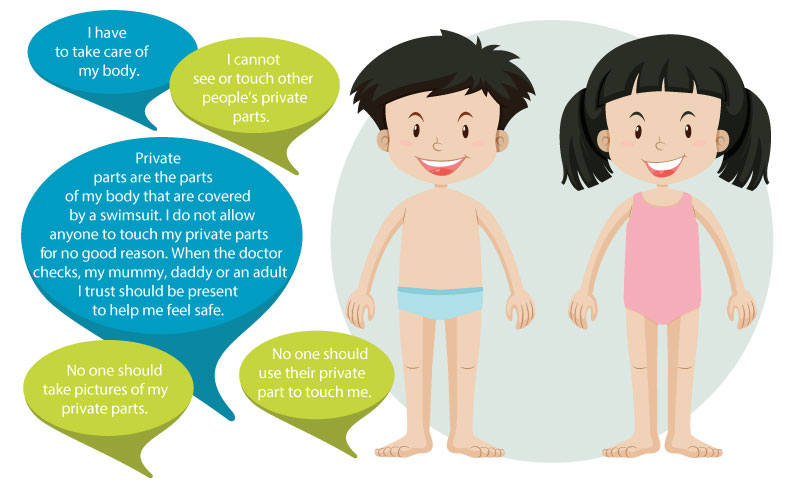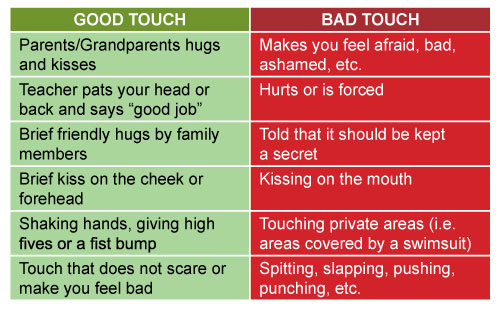Whenever you consider measures to ensure your children are safe, keep in mind the possibility of sexual abuse. Any child can be exposed to sexual abuse.
In surveys conducted among secondary school children in Malaysia, it was found that more than 10% of boys and girls had encountered some form of sexual abuse which involved exposure or physical contact. The majority of these children had been abused by someone known to them, which included relatives, neighbours, friends and teachers. Research in Asian countries has revealed that boys encounter this problem as much as girls. This is contrary to popular belief that girls are at greater risk of child sexual abuse.
Settings in which child sexual abuse can occur
Children can be exposed to the risk of sexual abuse within the homes of family and friends, at school, while participating in social and recreational or sports activities, in health care facilities as well as places of worship. With the advent of digital communication, children can be exposed to sexual abuse online, both by people known to them as well as relative strangers.
In all these settings, people who abuse children can create opportunities to be alone with them or take advantage of children who are not properly supervised. They may use different strategies to groom children and get their cooperation. Sometimes they may use interesting toys or activities to attract children to spend time with them. The initial approach towards a child may be seemingly innocent. Sometimes adults who are in positions of authority may abuse their authority to threaten a child.
Abusers use tactics such as bribes or threats to manipulate children to keep secrets. They may be able to convince a child that he or she would not be believed or would be blamed, if the child reveals the problem to anyone.
How to protect your children
The best way to protect your children from such psychological manipulation is to communicate and build a close relationship with them. Always let your children know that you love them unconditionally. Be involved in their lives and be aware of what they are doing. Focus on their all-round development, not just on their studies. Let them know that you are ready to help them with their problems. Answer their questions openly and honestly, according to their level of understanding and maturity. Be prepared to have discussions relating to changes in their bodies and sexual matters when they have doubts or are confused. This will ensure that they receive proper guidance from you according to your culture and values. It will also give them the confidence to approach you when they encounter a problem.
Explain to them clearly what is allowed and not allowed. When they make mistakes, stay calm and listen to them. Be prepared to discuss problems. Respond rationally and not emotionally. Children who know they are taken seriously will have the courage to speak up when they face difficulties.
Encourage your children to have good supportive friends and be good friends to others. Wherever your children go, ensure that they are adequately supervised. Avoid situations in which your child will be alone in the company of one adult, without anyone else present.
Teach your children respect for their bodies and that of others
Teach your children about good and bad touching
Tell your children that if they feel uncomfortable when someone touches or kisses them, they should say no and ask that person to stop. They should tell you or a trusted adult when this happens. Give them examples of who is a “trusted adult”.
Teach your children that if someone touches them in a bad way, it is not their fault. Explain to your child that even if they make mistakes, it is not okay for someone to punish them with a bad touch.
Reassure your children that you will always help and protect them from anyone who tries to hurt them.
Teach your child that not all secrets should be kept
Tell your child that if someone asks them to keep a bad secret, they should tell you and get help. Help your child to understand that people may use gifts or threats to get children to keep bad secrets.
Remember that sometimes, an adult within your family or social circle may try to take advantage of your child. Always trust your children and be prepared to support and protect them if this has happened.
Teach your children to be careful
Remind your children to walk away if a stranger tries to approach them with gifts or asks for information. Train them to shout for help and say “You are not my mother / father!” if a stranger comes too close and tries to pull them away.
Tell your children to check with you first if they have to provide any personal information online.
Tell your children not to chat, share information or send pictures to strangers on social media platforms such as Facebook, Whatsapp, Wechat or other platforms on mobile phones and computers. Remind them to think carefully about information and photographs they post on social networks.
Tell your children that they are not allowed to arrange a date or meeting with a person without your knowledge and permission.
GROOMING BEHAVIOUR IN ADULTS TO LOOK OUT FOR
Watch out for any of the following behaviour in adults that may be directed towards any child that you know. On the surface, these behaviours can appear innocent and convey the impression that a particular person is “good with children” or likes children.
Some warning signs
- frequently finding ways to be alone with a child, e.g. suggesting outings alone with the child, or offering to “look after” or babysit a child alone when parents are busy.
- ignoring a child’s need for privacy (e.g. in the bathroom).
- giving gifts or money for no particular reason.
- communicating with a child excessively; texting, emailing or calling.
What to do
If you have any concerns that your child may have been sexually abused:
- Talk to your child and ask if something is bothering him/her. Listen carefully to what they have to say.
- If your child reports something suspicious or has symptoms or behaviour which suggests possible sexual abuse, consult a doctor for advice.








Comments